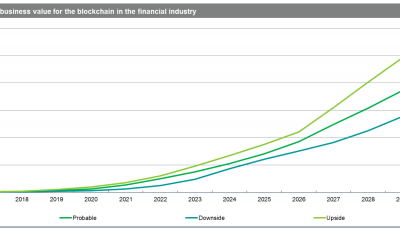Despite Wider Bitcoin Acceptance, Key Influencers Still Have Doubts
 Last week, everyone in the bitcoin and blockchain communities heard about the dismissive remarks made by Jamie Dimon, CEO of J.P. Morgan Chase, regarding bitcoin. Speaking at the Fortune GLobal Forum, Dimon explained that while he sees blockchain technology as having potential, it will be used to transport “dollars, not bitcoins.” His views on the future of bitcoin are rooted in the belief that currencies need government support (i.e. regulation) to be widely used. He explained that no government would go along with a currency that’s out of their hands.
Last week, everyone in the bitcoin and blockchain communities heard about the dismissive remarks made by Jamie Dimon, CEO of J.P. Morgan Chase, regarding bitcoin. Speaking at the Fortune GLobal Forum, Dimon explained that while he sees blockchain technology as having potential, it will be used to transport “dollars, not bitcoins.” His views on the future of bitcoin are rooted in the belief that currencies need government support (i.e. regulation) to be widely used. He explained that no government would go along with a currency that’s out of their hands.
Naturally, supporters of bitcoin have been quick to equally dismiss his comments and come to the defense of bitcoin. Bitcoinist, for example, published an article yesterday expounding the benefits of bitcoin. With recent rulings including that of the European Union, declaring bitcoin as a currency, it’s clear that bitcoin isn’t going away.
Nevertheless, the CEO of the largest bank in the United States expressing doubts regarding bitcoin can’t be easily dismissed. Dimon is an influencer. People listen to him, just like they listen to other financial gurus like Warren Buffett or Carl Icahn. And these leaders are just as skeptical: CoinTelegraph reported that Buffett made similar comments as Dimon, dismissing bitcoin as a “mirage,” and something that doesn’t have intrinsic value.
Government officials have also been skeptical about bitcoin, as well as blockchain technology. CoinDesk reported today that Securities and Exchange Commission (SEC) Commissioner Kara Stein expressed the technology has “potential,” but said she was “not advocating for the adoption or effectiveness of blockchain technology.” She said that blockchain technology will need to be constantly monitored by academics, regulators and market participants. She spoke about the technology at a Harvard Law School event where she discussed innovations that could impact United States’ capital markets.
Is this skepticism toward blockchain technology justified? It all depends on how one sees the technology being used. Blockchain technology has potential to add security and efficiency into markets and transactions. Within the realm of government regulation, blockchain still has a long way to go.
Coming back to doubts over bitcoin, governments are not trustful of the cryptocurrency because in the context of regulation, bitcoin can’t be touched. It exists outside of government influence. Of course, governments have been supportive of bitcoin and other cryptocurrencies (Bitcoinist gives Scotland, which is looking toward developing the digital currency called ScotPound, as an example). However, this support exists with the knowledge that government regulation will play at least some part.
Jeremy Allaire, CEO of Circle, wrote yesterday on Recode about the similarities between the attitude toward bitcoin and the attitude toward the Internet in its early days 20 years ago. Back then, governments and corporations wanted to focus on developing gated online services, as they were interested in the “technology behind the Internet,” while developers around the world coded and built on the core protocols of the Internet (HTTP/HTML, SMTP, etc.). Today, anyone can access the Internet and build a webpage, thanks to those smart coders.
Allaire argues that today’s interest in blockchain technology rather than bitcoin is very similar. Bitcoin is open source and controlled by no one. Allaire does caution us not to think about bitcoin as a currency, but instead as a “digital asset.” Nevertheless, in the same way the Internet beat out private information networks, bitcoin offers the opportunity to transform what he calls the “trust and assurance” industries, including finance.
Of course, proponents of bitcoin already know this. It’s the cryptocurrency that’s driving blockchain technology. At the time of this article, bitcoin’s price is hovering around $350. Some might not recognize the value of bitcoin, but that doesn’t mean it doesn’t exist.

![[Guest Post] Breaking Down Barriers with The Next Generation of DApps](https://coinreport.net/wp-content/uploads/2019/06/Jimmy-Zhong-CEO-of-IOST-400x230.jpg)










